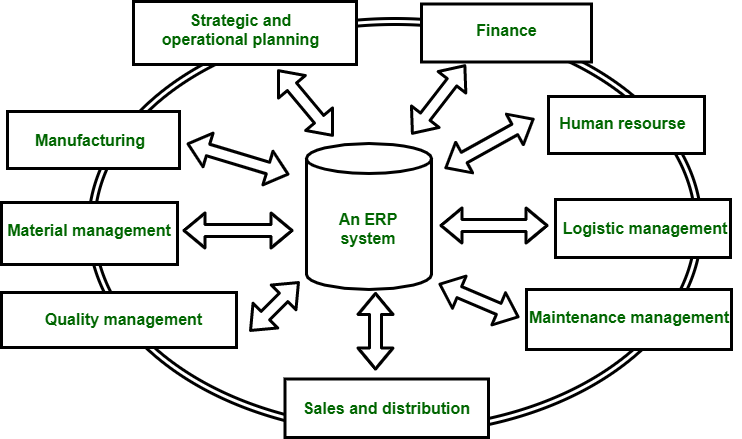Introduction to ERP
Last Updated :
24 Apr, 2023
ERP stands for Enterprise Resource Planning. ERP systems are the kind of software tools which are used to manage the data of an enterprise. ERP system helps different organizations to deal with different departments of an enterprise. Different departments like receiving, inventory management, customer order management, production planning, shipping, accounting, human resource management, and other business functions. Basically, it is the practice of consolidating an enterprise’s planning, its manufacturing, its sales and marketing efforts into one management system. It combines all databases across different departments into a single database which can be easily accessible to all employees of that enterprise. It helps in automation of the tasks involved in performing a business process.
Before ERP:

Figure – Before ERP
Before an ERP system, there are different databases of different departments which they managed by their own. The employees of one department does not know about anything about other department.
After ERP :

Figure – After ERP
After ERP system, databases of different departments are managed by one system called ERP system. It keep tracks of all the database within system. In this scenario, employee of one department have information regarding the other departments.
Vendors of ERP:
- Baan
- JD Edwards
- Oracle
- PeopleSoft
- SAP
Benefits of ERP:
- This system helps in improving integration.
- It is the flexible system.
- There are fewer errors in this system.
- This system improved speed and efficiency.
- There is a complete access to information.
- Lower total costs in complete supply chain.
- This system helps in Shortening the throughput times.
- There is sustained involvement and commitment of the top management.
- Enhanced Decision-Making: ERP provides real-time access to critical business data, enabling decision-makers to quickly identify and respond to issues, make informed decisions, and improve business outcomes.
- Improved Collaboration: ERP facilitates collaboration and communication between different departments and stakeholders, enabling them to work together effectively towards common business goals.
- Standardization of Processes: ERP ensures that business processes are standardized across the organization, reducing the risk of errors and inconsistencies and improving efficiency.
- Effective Resource Management: ERP enables efficient management of resources such as personnel, equipment, and inventory, ensuring optimal utilization and reducing wastage.
- Scalability: ERP is highly scalable and can be customized to meet the evolving needs of the business, ensuring that the system remains relevant and effective over the long term.
- Regulatory Compliance: ERP systems can help businesses comply with regulatory requirements by providing accurate and timely reporting, ensuring data privacy and security, and facilitating audits.
Limitations of ERP:
ERP system has 3 significant limitations:
- Managers generate custom reports or queries only with the help from a programmer and this will create a problem that they did not receive information quickly, which is essential for making a competitive advantage.
- There is no proper decision-making scenario i.e. this systems provide only the current status, such as open orders. Whenever there is need to look for past status to find trends and patterns it become difficult.that aid better decision-making.
- No doubt that data is integrated within the system, but there is no integration of data with other enterprise or division systems and it does not include external intelligence.
- High implementation costs: Implementing an ERP system can be expensive and time-consuming. It requires significant investment in hardware, software, and personnel, as well as training and consulting costs.
- Complex customization: Customizing an ERP system to meet the specific needs of an organization can be complex and require specialized knowledge. This can lead to delays and additional costs.
- Resistance to change: ERP systems often require significant changes to an organization’s processes and workflows, which can be met with resistance from employees who are comfortable with existing practices.
- Data security risks: Centralizing sensitive business data in an ERP system creates potential security risks, especially if the system is not properly secured or if there are vulnerabilities in the software.
- Limited flexibility: ERP systems are designed to provide standardization and control, which can limit the flexibility of an organization to respond to changing business needs and market conditions.
- Dependence on vendor support: Organizations that use ERP systems are often heavily dependent on the vendor for support, maintenance, and upgrades. This can create a risk of vendor lock-in and limit an organization’s ability to switch to other systems or providers.
Like Article
Suggest improvement
Share your thoughts in the comments
Please Login to comment...